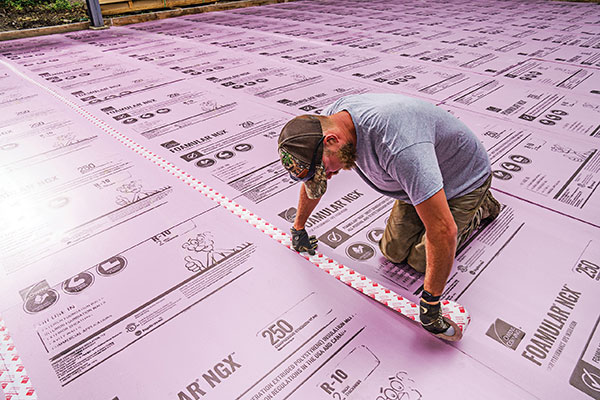Owens converts XPS insulation production in North America to lower GWP FOAMULAR NGX.

Owens Corning continues to introduce manufacturing achievements that help reduce the environmental footprint of buildings, as it announces the full conversion of its extruded polystyrene (XPS) insulation production to FOAMULAR® NGX® (Next Generation Extruded) in all US and Canadian plants. The conversion reflects Owens Corning’s leadership in achieving high-performing buildings and eliminating HFC 134a from its XPS insulation products a year before new environmental regulations go into effect.
The production conversion builds upon Owens Corning’s commitment to be a leader in the industry’s adaptation to new environmental regulations taking effect in 2025. The proprietary blowing agent in FOAMULAR® NGX® helps to reduce greenhouse gas emissions and delivers a greater than 80% reduction in embodied carbon of the product.1 Owens Corning’s efforts to help reduce the environmental impact of building products go beyond research and development, and the material science innovations that led to award-winning FOAMULAR® NGX®. Strategic sourcing and supply chain decisions also played a role in assuring production capacity. Investments in manufacturing capital – including the recent groundbreaking at a new manufacturing facility in Russellville, Arkansas – reflect the residential and commercial building sector’s robust demand for lower embodied carbon building materials.1
“The positive response from architects, contractors, and building product distributors to FOAMULAR® NGX® demonstrates that stakeholders throughout the construction sector are seeking innovations that help reduce the environmental footprint of their projects,” said Rodney Wideman, vice president and general manager of foam insulation at Owens Corning. He noted that they inspired Owens Corning to expedite the investments necessary to fully convert its production lines to FOAMULAR® NGX®. “The market’s interest in sustainable building materials influenced Owens Corning to develop products that not only exceed the requirements of stringent regulations but help customers achieve high-performing buildings while attaining their sustainability aspirations. At the end of the day, performance is non-negotiable and FOAMULAR® NGX® performs as well as the legacy product it replaces.”
FOAMULAR® NGX® is designed to maintain critical performance parameters, including a high R-5 per inch,2 superior moisture resistance, durability, and up to 100 psi of compressive strength, while reducing the material’s carbon footprint.1 Produced with 100% renewable electricity, FOAMULAR® NGX® offers an environmental product declaration (EPD) and a greater than 80% reduction in GWP1 which qualifies FOAMULAR® NGX® as two products under LEED v4.1 EPD Option 2.
“Achieving this production milestone is a critical step in Owens Corning’s sustainability journey and our ongoing environmental stewardship efforts,” said Wideman. “Whether installed in a commercial building or a family’s residence, FOAMULAR® NGX® can help reduce our footprint through advancements in material science and manufacturing innovation.”
Following the launch of FOAMULAR® NGX® in January 2021, Owens Corning was recognized by the National Association of Manufacturers and presented with the 2021 Manufacturing Leadership Award for outstanding achievement in material science innovation. Sustainability is a core value at Owens Corning as evidenced by the company’s inclusion on the Dow Jones Sustainability World Index for the 14th consecutive year.
Contact:
Megan Trout
Marketing Lead, Owens Corning Insulation
Megan.Trout@owenscorning.com
P: 419-248-8341
Footnotes:
Scott Ellyson, CEO of East West Manufacturing, brings decades of global manufacturing and supply chain leadership to the conversation. In this episode, he shares practical insights on scaling operations, navigating complexity, and building resilient manufacturing networks in an increasingly connected world.